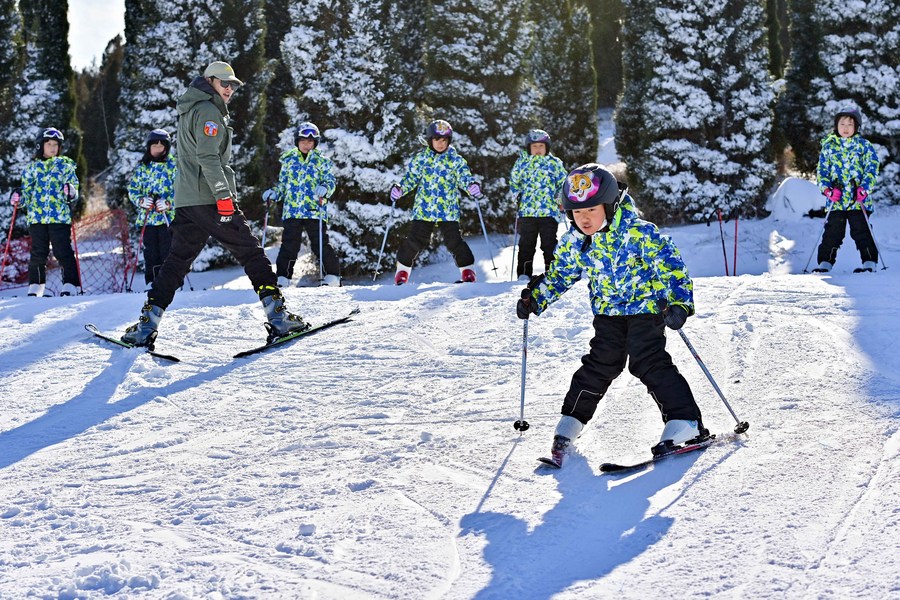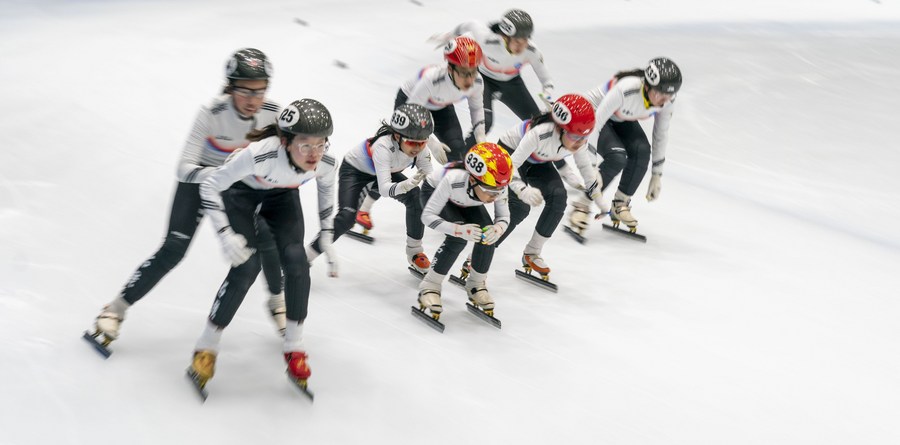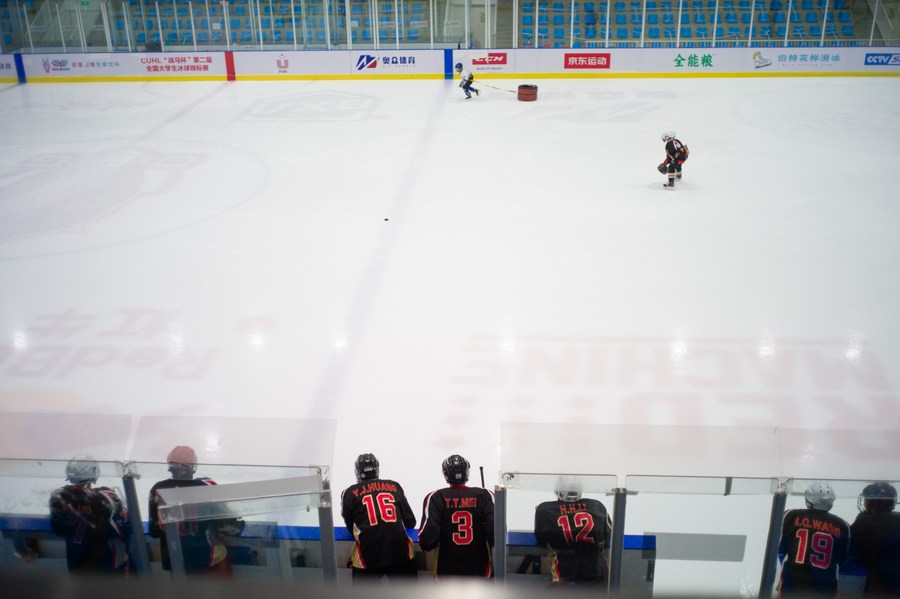


An instructor teaches a kid to ski at a ski resort in Qingzhou City, east China's Shandong Province, Dec. 25, 2021. (Xinhua/Wang Jilin)
More and more Chinese children are enjoying the happiness ice and snow sports bring, which is one of the biggest legacies of Beijing 2022.
by Sportswriter He Leijing
BEIJING, March 7 (Xinhua) -- Decked out in a miniature helmet, Liu Zhihao slips on the ice and picks himself up with a bashful smile, as the nine-year-old boy zooms around a packed indoor rink on ice skates in east China's Jiangsu Province.
"Skating is so much fun," said Liu, who is among the millions of Chinese children who tuned in to watch the Beijing 2022 Winter Olympics during their winter vacation. "Someday I will skate as fast as those professionals do."
Liu's mother, Wang Juan, signed her son up for a skating course right after the Games closed last month. "He was so inspired by the athletes that he persuaded me to take him to the ice," Wang said, adding that the sport could help enhance physical fitness and build up courage.
The unparalleled passion generated from the Winter Olympics looms large, as more and more Chinese children like Liu are heading to ice rinks and snow slopes to sample the pleasure of winter sports.

Young skaters participate in short track speeding training at Century Star Rink in Changping District of Beijing, capital of China, Feb. 15, 2022. (Xinhua/Cai Yang)
As of last October, around 346 million people have participated in winter sports since China's successful bid to host the Games. During the process, various indoor facilities are popping up even in the southern regions of the country where snow is a rarity.
"Sports venues and infrastructure are certainly the tangible legacies of the Games, but the human capital is possibly an even more impactful aftermath. Engaging and educating children and youths about the Olympic Games and Olympic values go beyond sport," said Christophe Dubi, an official with the International Olympic Committee.
SOWING SEEDS
Su Yiming, the 18-year-old snowboarding prodigy, is one of the millions of Chinese youths inspired by the Winter Olympics.
"On hearing that the Winter Games would be held in Beijing, I dreamed of joining the competition. But to qualify, I needed results in professional contests. So, from that moment, I decided to become a professional snowboarder," Su said after clinching silver in slopestyle and gold in Big Air at Beijing 2022.
Bai Xinyan, a snowboard lover and a student from Beijing's Dianchang Road Primary School, was hugely inspired by Su's feat, especially after witnessing her hero notching a gold medal on the scene as a spectator.
Bai keeps honing snowboarding skills at her school which has extensively promoted winter sports. "Elements of the Games can be seen everywhere and we even have a Winter Olympics museum and a curling stadium," she said. "All of the 300 students have access to real ice and snow."
Created after China's successful Olympic candidacy, the "Beijing 2022 Education Program" is an unprecedented push to engage the younger generation towards winter sports. By the end of 2021, more than 2,800 schools across the country had integrated winter sports into their curriculums.
Students further away from the snow have been practicing "dry land" versions of winter sports and receiving theory classes, interactive training, and courses incorporating Olympic values such as fair play and mutual respect.
And the Chinese children are expected to carry forward the Olympic flame.
"If a Chinese ice hockey player stands on the podium in 20 years and says he plays the sport because he watched the Games in 2022, that will be a success for our generation," said ice hockey player Ye Jinguang.
China's men's ice hockey team made its Olympic debut at Beijing 2022. "Though there's still a long way to go for the team, we hope we can plant the seeds of ice hockey in the hearts of more Chinese children," Ye told reporters during the Games.

Players of the Beijing 1979 Ice Hockey team watch children training before their own training session in Beijing, capital of China, Jan. 30, 2021. (Xinhua/Wu Zhuang)
HAPPY CHILDHOOD
At a training center for winter sports equipment industrial park in Zhangjiakou, the co-host city for Beijing 2022, local schools recently started offering weekly training for curling, ice hockey, and skiing on simulators.
"I fell in love with curling the first time I tried it," said Wang Ye, a 12-year-old who practiced curling on a specially made ice-like sheet, noting that he knew nothing about the sport before the Games.
China launched its "double reduction" policy to ease academic stress for elementary and junior high school students last year. The policy has reduced excessive homework and curbed the frequency of exams and after-school tutoring in core school subjects.
Since then, schools and millions of families have been placing more emphasis on sports. And more parents, inspired by the Games, are jumping at winter sports when it comes to suggesting a hobby for their children.
"My daughter now has enough time to learn skiing during the winter vacation," said Zhen Qian, a mother in Shanghai. She added that her 13-year-old used to attend several after-school classes in major subjects, but now has just one painting class and one skiing course.
"More children now have spare time to pick up skis and snowboards as their schoolwork is no longer heavy," Zhen said.
"And winter sports is undoubtedly becoming part of their happy childhoods," she added.
点击右上角![]() 微信好友
微信好友
 朋友圈
朋友圈

请使用浏览器分享功能进行分享
